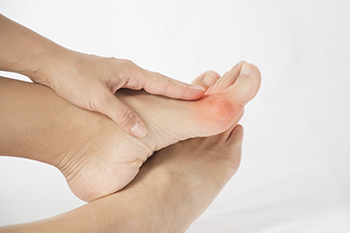
A bunion, a common foot deformity, is characterized by the gradual misalignment of the joint at the base of the big toe. This condition results in the enlargement of the joint, causing the big toe to angle toward the other toes. Bunions can lead to discomfort and pain due to the increased pressure on the joint and the rubbing of shoes against the protruding bone. Symptoms often include redness, swelling, and tenderness at the affected site, accompanied by restricted movement of the big toe. Wearing ill-fitting shoes, especially those with a narrow toe box, can exacerbate bunion development. Genetics also play a role, as certain foot structures and inherited tendencies can contribute to bunion formation. If you have a bunion, it is strongly suggested that you visit a podiatrist who can provide you with appropriate relief and treatment options.
If you are suffering from bunion pain, contact Shawn Echard, DPM of Laurel Podiatry LLC. Our practitioner can provide the care you need to keep you pain-free and on your feet.
What Is a Bunion?
Bunions are painful bony bumps that usually develop on the inside of the foot at the joint of the big toe. As the deformity increases over time, it may become painful to walk and wear shoes. Women are more likely to exacerbate existing bunions since they often wear tight, narrow shoes that shift their toes together. Bunion pain can be relieved by wearing wider shoes with enough room for the toes.
Causes
- Genetics – some people inherit feet that are more prone to bunion development
- Inflammatory Conditions - rheumatoid arthritis and polio may cause bunion development
Symptoms
- Redness and inflammation
- Pain and tenderness
- Callus or corns on the bump
- Restricted motion in the big toe
In order to diagnose your bunion, your podiatrist may ask about your medical history, symptoms, and general health. Your doctor might also order an x-ray to take a closer look at your feet. Nonsurgical treatment options include orthotics, padding, icing, changes in footwear, and medication. If nonsurgical treatments don’t alleviate your bunion pain, surgery may be necessary.
If you have any questions, please feel free to contact our offices located in Greensburg and Somerset, PA . We offer the newest diagnostic and treatment technologies for all your foot care needs.
